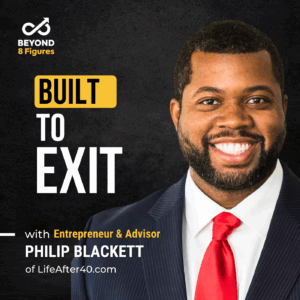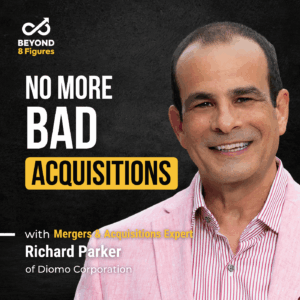One of the biggest takeaways from our 2024 episodes is the importance of leveraging resources. We’re talking about smartly utilizing the tools and strategies available to you to streamline operations, make better decisions, and ultimately free up your time and energy to focus on what matters most. Think about it. You’re already deeply into the day-to-day life of your business and you’re probably feeling the pressure to scale even further while maintaining a healthy work-life balance. That’s where leveraging resources comes in.
I was the bottleneck, the one man show trying to juggle all the hats. So basically it was a recipe for burnout. But what I’ve learned from our guests this year is that you don’t have to do it all alone. There are powerful tools like AI and strategic partnerships that can help you take your business to the next level without sacrificing your sanity. For example, our guest, Hamza Mudassir, a professor at Cambridge and the founder of an AI powered platform that helps businesses make smarter decisions, shared his perspective on using AI as your strategic co-pilot. He said, “So how do you solve for that? And that’s the part where research sort of indicated a couple of things which we have built large parts of already and deployed it with sort of a variety of customers. But effectively, what it tells you is this, that you could have an AI that can effectively not just navigate a digital twin of your company and make great decisions and do it in a variety of scenarios that you can learn from”.
Hamza emphasized building a digital twin of your business, a virtual representation where you can safely experiment with different strategies and scenarios without any real world consequences. Imagine being able to test out new marketing campaigns, product launches or pricing models in a risk free environment before implementing them in your actual business. For those of you who are feeling overwhelmed by the sheer volume of information and options out there, Hamza offered a brilliant solution. AI can help you cut through the noise and make smarter decisions. He said, there’s just so much noise and so I found that to be a really difficult problem to solve. Where do you find someone who understands you well enough but does not have an agenda? That’s where AI comes in. It can process vast amounts of data and provide you with unbiased insights to guide your strategic decisions. It was a very interesting conversation. You can find the link to the full interview in the show Notes.
~ Quick announcement here. We’re kicking off something really special called the “Beyond Growth Giveaway”. We have put together access to premium tools and mentorship from some of the best in the business. Trust me, you don’t want to miss it. Stick around for all the details coming your way soon.~
Another interesting conversation I had this year, I mean all were very interesting but this one is one of the highlights was with Steve Maly, founder of a top tier marketing agency who shared his insights on using AI to boost efficiency and enhance client services. He said, “So a lot of it for us, we’re continuing internally. So we got internal, external. Internally, we’re continuing to take a look at just efficiencies. How can we use the different tools to brainstorm? How can we use different tools to storyboard out a concept that is maybe a unique concept?”.
Steve pointed out that AI can be a game changer for agencies like his, helping them to automate repetitive tasks, generate creative content and deliver more personalized and effective marketing solutions for their clients. He even mentioned that some of his clients are already using AI to generate copy and images, which can be a huge time saver for busy entrepreneurs. He also shared a valuable tip. “For those of you who are thinking about incorporating AI into your marketing strategy, focus on crafting the right prompts”, he said. “And along the external side of it, like at times we’ll have clients that will send us over AI driven copy or images or whatever. And sometimes you can tell pretty quick, like it comes down to the prompts that you put in. They’ll kind of grab your prompts. That’s where you’re going to get back out of it”. But again, it’s a starting point. The quality of your output depends on the quality of your input. So take the time to clearly define what you want to achieve and guide the AI with specific instructions.
These are just a few examples of how AI can be a game changer for entrepreneurs at all stages of their journey. Whether you’re using it to make smarter decisions, streamline your operations, or create more innovative products and services, the key is to experiment and find what works best for you. And don’t forget about the power of strategic partnerships. Look for opportunities to collaborate with other businesses or individuals who can complement your skills and resources. This can be a powerful way to expand your reach, tap into new markets and accelerate your growth.
And another thing we should not forget, because it’s crucial, is building the right team. Yes, leveraging resources is essential, but it’s only part of the equation. You also need to build the right team to support your growth and vision. We’re talking about assembling a squad of rockstars who are aligned with your mission, bring diverse skills and perspectives to the table, and most importantly, make your entrepreneurial journey more enjoyable. I mean, I’m sure many of you can relate to the early days of building your business when you were wearing all the hats and working around the clock. We all have been there. It’s a rite of passage for entrepreneurs. But it’s not sustainable in the long run. And if you are an entrepreneur listening to this, you know what I’m talking about.
As your business grows, you need to transition from being a solopreneur to a leader who can build and inspire a high performing team. This means letting go of control, delegating effectively and focusing on creating a culture that attracts and retains top talent. And this is something I talk about with Paola Telfer, founder of a neurotechnology company that helps people optimize their brain health. She emphasized the importance of defining your legacy and core values as the foundation for building a strong team culture. I remember she’s saying, “We built around our legacy. That was really the beginning of Sens.ai. We sat and answered three questions and we did it in the same room, in the same space, about 15 minutes. Really just off top of your head, really heartfelt, what is the legacy we want to leave? So from a deathbed perspective, obituary sort of writing hat on, what do I want to do with a time in this life that I actually from my deathbed think, yes, I spent my time well?”
What it means is when you’re clear about what you stand for and what you want to achieve, it becomes much easier to attract people who are aligned with your vision and values. And when you have a team of people who are passionate about your mission, it creates a powerful sense of purpose and camaraderie that can fuel your growth. And that brings me to my conversation with Devan Kline, CEO of a rapidly growing fitness franchise, shared his system for creating a common language within his organization. He said, “Create something that sounds like you’re very familiar with it. In our case, instead of going out and recreating the plan, we just used a plan that’s been proven to work thousands of times by other companies and we made it our own. And what that did was create a common language. And I think this is so crucial, especially as you start scaling your business. When everyone is speaking the same language, it eliminates confusion, reduces errors, and allows for seamless communication and collaboration.”
Think about it in terms of your own family, you have your own unique way of communicating. Inside jokes, shared experiences, shorthand phrases that only you understand. It’s what makes your family special. Well, the same applies to your business. Creating a common language within your team helps to build trust, foster a sense of belonging, and create a more cohesive and productive work environment. Building the right team is a journey, not a destination. Requires ongoing effort, but it’s one of the most rewarding aspects of being an entrepreneur.
The power of mindset, while resources and teams are crucial, let’s not forget the most important ingredient for entrepreneurial success, the power of mindset. Your mindset is the internal operating system that drives your thoughts, beliefs and actions. For entrepreneurs, a positive, growth-oriented mindset is essential for navigating the inevitable challenges and setbacks that come with the territory. It’s about cultivating resilience, embracing change, and continually learning and evolving. Paola Telfer, the neurotechnology entrepreneur we mentioned earlier, shared a powerful insight about the importance of maintaining mental clarity and focus, especially in the face of the constant demands and distractions that entrepreneurs face. She said, but the reality is we’re constantly subjected to a gazillion things happening to us. Life happens, always something. And yet, as entrepreneurs, the more we can bring our focus to bear, the more we’re able to impact what we’re trying to do create in this world. And it’s hard. I know you guys are juggling a lot – building your business, raising your families, trying to maintain some semblance of a personal life. It’s easy to get scattered and lose sight of your goals. But as Paola pointed out, the more focused you are, the more effective you’ll be in achieving your goals. So how do you cultivate mental clarity and focus? It’s about prioritizing your well being, setting clear boundaries and developing practices that help you to stay grounded and centered. Whether it’s meditation, exercise, spending time in nature, or simply taking regular breaks throughout the day, find what works for you and make it a non-negotiable part of your routine.
We also heard from Austin Linney, an entrepreneur who is passionate about empowering others to achieve their full potential, who shared a powerful quote about taking action and learning from mistakes. He said, “You’ve read enough books, you’ve listened to enough podcasts. Whatever it is that you were thinking about doing, just go do it and I promise you you’ll learn more about yourself than you’ve ever thought. Because the highest form of personal development that I found is running the small business, it has asked me to be more than I have ever thought I was capable of just in the short time that we’ve had it”. This is something I’ve learned time and time again in my own entrepreneurial journey. You can plan, you can strategize, but ultimately you have to take action and be willing to learn from your mistakes. The entrepreneurial path is not for the faint of heart. It’s about embracing the unknown, being comfortable with discomfort, and constantly pushing yourself beyond your comfort zone.
This leads us to our final theme, finding your entrepreneurial success. Success is a deeply personal concept and it means something different to each of us. For you, it might be about achieving financial freedom, building a legacy for your family, making a positive impact on your community, or simply having the flexibility to design a life that you love. The key is to define what success means to you and then align your business goals with your personal values. This is about creating a business that serves your life, not the other way around. Eric Bandholz, founder of a lifestyle brand that celebrates the bearded lifestyle, talked about the importance of prioritizing your quality of life and finding a balance that works for you. One of the key things he mentioned in our conversation was, “To me, the difference between a $3 million business right now, 15% to 20% profit, and a $20 million one doing 10% profit is not much difference in your quality of life. So there is, in my opinion, a point of diminishing returns. And I think if you’re a solopreneur, that’s around $1.5 million revenue. If you’ve got a couple of partners or like 50% revenue, then that’s around $3 million. You can do the math from there. But like at $3 million, 50% ownership, making 15% is $450,000 a year, something like that, that’s a good life. That’s a really good life”.
Look, Eric’s point about diminishing returns is something that I think a lot of entrepreneurs can relate to. We often get caught up in the pursuit of more. More revenue, more customers, more growth. But at what cost? It’s important to pause and ask yourself, is this growth actually serving my life or am I sacrificing my well being and relationships in the pursuit of an arbitrary number?
Jon Matzner, an entrepreneur who has built multiple successful businesses by focusing on creating lazy leverage, reminded us that entrepreneurial success is not a linear path. He said, “And then just work to try to buy the truck and then lease the truck out to a different Uber driver who gives me a dollar an hour. And then build your leverage as you go. You don’t start with high leverage. You have to earn it is how I think about it”.
There will be ups and downs, twists and turns, and unexpected detours along the way. It’s about embracing the journey, learning from your experiences, and continually adapting your course as you go. So don’t get discouraged if your path doesn’t look like anyone else’s. There’s no one size fits all approach to entrepreneurial success. It’s about finding what works for you, building a business that aligns with your values, and creating a life that you love.
I hope you found this recap episode valuable. I encourage you to revisit the full episodes we’ve highlighted today and connect with the guests who resonated with you. Remember, you’re not alone on this journey. There’s a whole community of entrepreneurs out there who are facing similar challenges and celebrating similar victories. And if there’s one thing I want you to take away from this episode, it’s this. Don’t be afraid to leverage resources, build the right team, cultivate a powerful mindset, and define your own version of entrepreneurial success. Keep learning, keep growing, and keep growing your journey. I’ll see you on the next episode of Beyond 8 Figures. Thank you.






